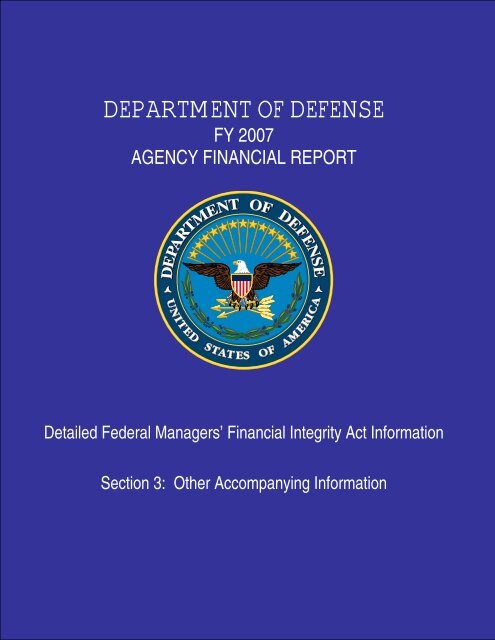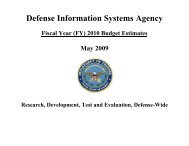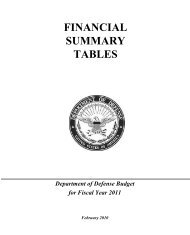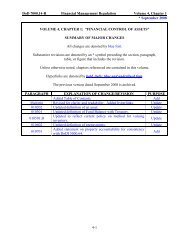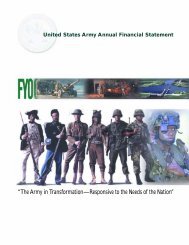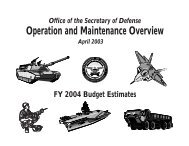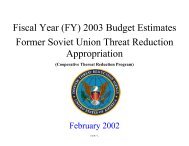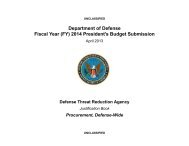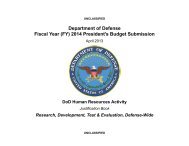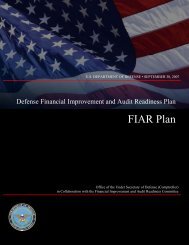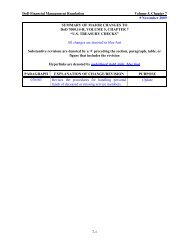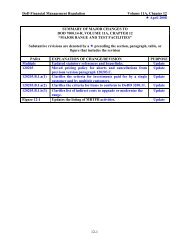DEPARTMENT OF DEFENSE - Comptroller
DEPARTMENT OF DEFENSE - Comptroller
DEPARTMENT OF DEFENSE - Comptroller
You also want an ePaper? Increase the reach of your titles
YUMPU automatically turns print PDFs into web optimized ePapers that Google loves.
Department of Defense Agency Financial Report 2007<br />
<strong>DEPARTMENT</strong> <strong>OF</strong> <strong>DEFENSE</strong><br />
FY 2007<br />
AGENCY FINANCIAL REPORT<br />
Detailed Federal Managers’ Financial Integrity Act Information<br />
Section 3: Other Accompanying Information<br />
1
Management Assurances<br />
√CHECK IT<br />
Department of Defense Agency Financial Report 2007<br />
The Department of Defense (DoD)’s leadership is keenly aware and actively involved in helping its<br />
managers and employees understand that effective internal management controls are important to getting<br />
the job done right. The Department reminds its personnel that the Defense mission cannot be accomplished<br />
by the warfighters alone; everyone has a job to do, and every job is important. Internal management<br />
controls help ensure that what should happen does happen on a daily basis, but first internal management<br />
controls must be in place, effective and used. To help draw the attention of the approximately 2.9 million<br />
employees in nearly 140 countries, the Deputy Secretary of Defense kicked off an awareness campaign<br />
known as the “Check It” Campaign. The slogan states, “Check It. What gets checked, gets done.”<br />
TOTAL MEDIA PRODUCTS COMPLETED TO DATE<br />
(2)<br />
Deputy Secretary of Defense hosted<br />
√CHECK IT Ceremonies<br />
• Kickoff<br />
• Phase One Finale<br />
√CHECK IT CAMPAIGN<br />
(11)<br />
Public Service<br />
Announcements<br />
(15)<br />
Posters<br />
(8)<br />
Interviews<br />
(87) Leaders & Staff<br />
Recognized for √CHECK IT<br />
Participation<br />
(40 of 87) Senior level officials<br />
recognized to include:<br />
• Controller, OMB<br />
• <strong>Comptroller</strong> General<br />
The DoD is conducting the Check It Campaign in two phases. Just completed, Phase One was a year-long<br />
communication and awareness campaign to disseminate the significant role of internal management<br />
controls for functional areas beyond accounting and finance. Each month, leadership was actively involved<br />
in crafting messages used in public service announcements broadcast on the Pentagon Channel and the<br />
American Forces Information Service and posters distributed world wide. Leaders also provided<br />
interviews, briefings, and other media vehicles such as web pages to transport the message down to every<br />
level of the Department. In August, the Deputy Secretary of Defense recognized over 87 leaders and staff<br />
for active involvement in Phase One of the Check It Campaign.<br />
Month and Year<br />
√CHECK IT PHASE ONE<br />
√CHECK IT Focus<br />
COMPLETED<br />
√CHECK IT Activities<br />
July 2006 Overall<br />
Deputy Secretary of Defense √CHECK Kickoff Ceremony<br />
(5) Posters<br />
(1) Public Service Announcement<br />
Controller, OMB, – (1) Interview<br />
<strong>Comptroller</strong> General – (1) Interview<br />
August 2006 Financial Management Under Secretary of Defense (<strong>Comptroller</strong>) – (2) Interviews<br />
(1) Public Service Announcement<br />
(2) Posters<br />
September 2006 Acquisition<br />
(1) Public Service Announcement<br />
(1) Poster<br />
October 2006<br />
Joint Military<br />
Operations<br />
(1) Public Service Announcement<br />
(2) Posters<br />
November 2006 Personnel<br />
Under Secretary of Defense (Personnel & Readiness) –<br />
(1) Presentation at Internal Control Conference<br />
1
Department of Defense Agency Financial Report 2007<br />
√CHECK IT PHASE ONE (cont)<br />
Month and Year √CHECK IT Focus √CHECK IT Activities<br />
COMPLETED (con’t)<br />
Overall DoD International Internal Control Conference<br />
December 2006 Information<br />
Technology<br />
January 2007 Logistical Functions<br />
February 2007 Medical Functions<br />
March 2007 Financial Reporting<br />
and Accounting<br />
April 2007 Safety<br />
Assistant Secretary of Defense (Networks and Information<br />
Integration) – (1) Interview<br />
(1) Public Service Announcement<br />
(1) Poster<br />
Deputy Under Secretary of Defense (Logistics and Materiel<br />
Readiness) – (1) Interview<br />
(1) Public Service Announcement<br />
(1) Public Service Announcement<br />
(1) Poster<br />
Director of Financial Reporting and Analysis, Office of the<br />
Under Secretary of Defense (<strong>Comptroller</strong>) – (1) Interview<br />
Director of Defense Finance and Accounting Service –<br />
(1) Interview<br />
(1) Public Service Announcement<br />
(1) Poster<br />
(1) Public Service Announcement<br />
(1) Poster<br />
May 2007 Military Operations (1) Public Service Announcement<br />
June 2007 Intelligence and (1) Public Service Announcement<br />
Security Operations (1) Poster<br />
August 2007 Overall<br />
Deputy Secretary of Defense Phase One Finale Ceremony<br />
√CHECK IT Phase Two Begins (See next chart)<br />
Improving internal management control is process improvement. Phase Two of the Check It Campaign,<br />
beginning in October 2007, recognizes those DoD Components that can provide documented evidence of<br />
the “best” improvements made to a process as a result of “Checking It” (those internal management<br />
controls).<br />
Quarter and Fiscal Year<br />
√CHECK IT PHASE TWO<br />
√CHECK IT Interviews With<br />
PROJECTED<br />
√CHECK IT Other Activities<br />
1 st Quarter 2008<br />
(October – December)<br />
2 nd Quarter 2008<br />
(January – March)<br />
3 rd Quarter 2008<br />
(April – June)<br />
4 th Quarter 2008<br />
(July – September)<br />
Enlisted Military Leadership<br />
Service Military Officers<br />
Component Heads Recognized for Process<br />
Improvement Due to √CHECKing IT<br />
Combatant Commanders<br />
Joint Commanders<br />
Component Heads Recognized for Process<br />
Improvement Due to √CHECKing IT<br />
Posters and Public<br />
Service Announcements<br />
Posters and Public<br />
Service Announcements<br />
Posters and Public<br />
Service Announcements<br />
Posters and Public<br />
Service Announcements<br />
Another main purpose of the Check It Campaign is to cultivate a culture of integrity, accountability and<br />
forthright reporting required under the Federal Managers’ Financial Integrity Act of 1982, which is<br />
discussed below.<br />
2
Federal Managers’ Financial Integrity Act<br />
Department of Defense Agency Financial Report 2007<br />
The Federal Managers’ Financial Integrity Act (FMFIA) requires Federal agencies to assess the<br />
effectiveness of internal management controls for all program, operational, and administrative areas and not<br />
just accounting and financial management. Internal management controls are the checks and balances that<br />
help program and financial managers achieve results and safeguard the integrity of their programs. Internal<br />
management control strengthens integrity and accountability within programs and operations, and :<br />
• Is critical for “good government”<br />
• Demonstrates responsible stewardship over assets and resources<br />
• Promotes accountability of Departmental assets and of our leadership<br />
• Enhances the sound delivery of services to customers<br />
• Maximizes desired program outcomes.<br />
DoD Managers’ Internal Control Program<br />
The Department conducts self-assessments of the internal management controls under a formalized<br />
program known as the Managers’ Internal Control Program, which is conducted throughout the Department<br />
to include forward deployed units such as the Multi-National Forces - Iraq. Using assessments according to<br />
the Office of Management and Budget Circular A-123, “Management’s Responsibility for Internal<br />
Control,” as the basis, the Department prepared the fiscal year 2007 Annual Statement of Assurance<br />
(presented in the Management’s Discussion and Analysis section of this report). The Department asserts<br />
that all Components as prescribed by the Department’s regulatory guidelines have reported their individual<br />
statements of assurance over internal control to the Secretary.<br />
The Department’s internal management control program is divided into two main processes:<br />
1) The overall operations statement of assurance that covers the effectiveness of internal management<br />
controls for all functions and processes except for the financial reporting.<br />
2) The statement of assurance over financial reporting which covers the effectiveness of internal<br />
management controls as prescribed by Appendix A of the OMB Circular A-123.<br />
The Department has 34 entities required to report including (3) Military Departments, (9) Combatant<br />
Commands, (1) Joint Staff, (1) Office of the Secretary of Defense, (1) Office of the Inspector General, (18)<br />
DoD Agencies, and (1) DoD Financial Reporting Senior Assessment Team. Components are required to<br />
conduct a robust programmatic approach to establishing and assessing internal management controls for the<br />
overall operations with the Component heads annually providing assurance to the Secretary of Defense.<br />
Only specified Components are also required to include financial reporting assurance. The Department<br />
uses these feeder statements as the basis for the Department’s Statement of Assurance. The Department<br />
has dramatically reduced the number of outstanding material weaknesses since fiscal year 2001, by 84<br />
percent from 116 material weaknesses to 19 in fiscal year 2007. The percentage of material weaknesses<br />
resolved rose from 21 percent in fiscal year 2006 to 34 percent in fiscal year 2007.<br />
Types of Self-Reported Material Weaknesses<br />
The Department reports several types of weaknesses. Table 1 shows the material weaknesses in financial<br />
statement reporting that were identified by the Department of Defense Inspector General, who audits the<br />
annual financial statements. Table 2a identifies financial reporting weaknesses, Table 2b identifies overall<br />
material weaknesses, and Table 2c identifies system nonconformances identified by the Department<br />
through its internal management control process. Details about each weakness to include definitions and<br />
actions to resolve them are presented in expanded tables available at<br />
http://www.defenselink.mil/comptroller/afr/fy2007/fy07afrsection3fmfia.pdf<br />
3
Department of Defense Agency Financial Report 2007<br />
, Table 2d summaries the Department compliance with the Federal Financial Management Improvement<br />
Act of 1996.<br />
The Department self-identified weaknesses fall into three categories:<br />
1. Section 2 Financial Reporting Material Weaknesses: Weaknesses identified as materially affecting<br />
the Department’s financial reporting identified under the oversight of the DoD Senior Assessment Team<br />
during the limited assessment of internal controls over financial reporting. The Department is using an<br />
incremental approach in complying with the OMB Circular No. A-123, Appendix A. In fiscal year 2007,<br />
the assessments conducted include: fund balance with Treasury, investments, accounts receivable,<br />
inventory, operating materials and supplies, real property, military equipment, accounts payable, Federal<br />
Employees’ Compensation Act liabilities, environmental liabilities, Medicare-Eligible Retiree Health Care<br />
Liabilities, and appropriations received.<br />
2. Section 2 Overall Operations Material Weaknesses: Weaknesses materially affecting internal<br />
management controls usually affecting multiple DoD components for all functions except financial<br />
reporting weaknesses unless those financial weaknesses were identified through assessments which were<br />
not under the oversight of the DoD Senior Assessment Team. At this time, there is only one material<br />
weakness, General Personal Property, that is functionally part of the financial reporting, but is included in<br />
the overall material weakness category because the assessment did not fall under the oversight of the DoD<br />
Senior Assessment Team.<br />
3. Section 4 System Nonconformance Weaknesses: Material weakness(es) in the system conformance<br />
with government-wide requirements such as the Federal Financial Management Improvement Act as<br />
prescribed by OMB Circular No. A-127. The Department is reporting one weakness that covers the entire<br />
pervasive problems identified with system nonconformance.<br />
DoD Reportable Conditions. Weaknesses identified as materially affecting only one DoD Component<br />
unless the weakness is so pervasive that it is deemed material to the Department as a whole. Reportable<br />
conditions, as prescribed in the OMB A-123, are not reported in the DoD Statement of Assurance, but are<br />
tracked internally for correction. The Department is reporting five weaknesses in fiscal year 2007 as a<br />
reportable conditions that were previously reported as material weaknesses.<br />
In addition to FMFIA, the DoD reports as material weaknesses, the lack of conformance with the Federal<br />
Financial Management Improvement as item number 19 in Table 2b, Summary of Management<br />
Assurances, Other Accompanying Information, and significant deficiency in information security under the<br />
Federal Information Security Management Act as item number 20 in Table 2b.<br />
Improvements As A Result of Statement of Assurance Scorecard<br />
The Department implemented a Statement of Assurance scorecard in fiscal year fiscal year 2003, which<br />
scores the DoD Component performance in five categories: timeliness, format and accuracy, extent of<br />
program execution, extent of training, and prompt resolution of material weaknesses. The DoD Statement<br />
of Assurance scorecard provides extra credit points for exceptional performance, which has created a<br />
friendly competitive energy to improving the DoD Statement of Assurance and more prompt resolution of<br />
material weaknesses. In addition, the DoD implements a quarterly review and each mid-year provides the<br />
DoD Component Heads an indication of their success rate in resolving weaknesses as projected in<br />
comparison to the other DoD Components. Since initiating the scorecard and quarterly reviews in fiscal<br />
year 2003, DoD Components have significantly improved the timeliness of the reporting and promptness of<br />
material weakness resolution. Timeliness has improved from only 48 percent on time in fiscal year 2003<br />
to 97 percent in fiscal year 2007. The mean score for the timeliness category rose 9 percent from 2.4 in<br />
fiscal year 2006 to 2.6 percent in fiscal year 2007. The total number of outstanding material weaknesses<br />
decreased by 46 percent from 35 in fiscal year 2006 to 19 in fiscal year 2007, and the mean score for<br />
promptly resolving material weaknesses rose 25 percent from 2.0 in fiscal year 2006 to 2.7 in fiscal year<br />
2007.<br />
4
Statement of Assurance over Financial Reporting Process:<br />
Department of Defense Agency Financial Report 2007<br />
The Department is using an incremental approach in implementing Appendix A of the OMB Circular A-<br />
123, and leveraging to the extent possible, existing initiatives such as the DoD Financial Improvement and<br />
Audit Readiness (FIAR) Plan management tools and existing audit documentation.<br />
At the beginning of fiscal year 2006, the Deputy Secretary of Defense established a Senior Assessment<br />
Team composed of senior leaders as the governing body for DoD Appendix A implementation. The team<br />
defines the scope of the assessments used within the Department, determines the DoD financial reporting<br />
weaknesses, and monitors the progress of corrective actions. Additionally, based on materiality, certain<br />
DoD components were also required to establish Senior Assessment Teams that monitor the DoD<br />
component Appendix A implementation process.<br />
The Department issued guidance at the beginning of fiscal years 2006 and 2007 that prescribed procedures<br />
for conducting flow charts, risk assessments, and control analyses to help promote consistency and<br />
comparability of data throughout the Department. In addition, the test plan guidance was issued in March<br />
2006 prescribing a standardized process for developing test plans, which included universe and sample size<br />
determination, independent testing, tolerance levels, and test methods.<br />
The Department is leveraging its FIAR Plan for the Appendix A implementation by using the resources and<br />
capabilities already established for the FIAR Plan. The FIAR Plan is the Department’s path to audit<br />
readiness and an unqualified audit opinion. The plan describes major impediments identified by auditors<br />
and management and sets milestones for resolving problems affecting the accuracy, reliability, and<br />
timeliness of financial information. For process solutions, the plan addresses known major deficiencies and<br />
captures work done or to be done by large Defense components in assessing their weaknesses and<br />
developing necessary plans for overcoming those weaknesses. The Department is using an incremental<br />
approach in implementing Appendix A of the OMB Circular A-123, which is congruent with the focus<br />
areas of the FIAR Plan. The Department will continue to align its focus areas of the Appendix A effort to<br />
be congruent with the FIAR Plan in an effort to maximize resources.<br />
Training and Education<br />
The management of the Department of Defense understands that training and education are crucial to the<br />
successful execution of the internal management control program and the √CHECK IT internal awareness<br />
campaign. The Office of Under Secretary of Defense (<strong>Comptroller</strong>) conducted training for over 3,300 of<br />
the DoD components personnel at locally sponsored training workshops all over the world to include our<br />
American Forces in Baghdad, Iraq. In addition, the DoD conducted an internationally attended<br />
Department-wide training conference attended by more than 200 representatives from the Department’s 34<br />
components at the National Defense University in Fort McNair, DC.<br />
√CHECK IT AND INTERNAL MANAGEMENT CONTROL TRAINING<br />
TOTAL PROVIDED BY <strong>OF</strong>FICE <strong>OF</strong> THE SECRETARY <strong>OF</strong> <strong>DEFENSE</strong> (COMPTROLLER)<br />
(3,300) DoD Employees trained<br />
(3) Workshops in FYs 2006, 2007, and 2008<br />
(28) DoD Component Workshops<br />
Support to American Forces conducted in Baghdad, Iraq<br />
5
Good News as a Result of Our Efforts!<br />
Department of Defense Agency Financial Report 2007<br />
The DoD leadership considers improvements in internal management controls synonymous with good<br />
business. Our motto is: Improving Internal Management Control Is Process Improvement!! The DoD<br />
Component Heads provided the following improvements accomplished in fiscal year 2007 as part of their<br />
DoD Component Statements of Assurance.<br />
Process Improved By Whom? Improvement<br />
Delinquency rate of government travel United States Strategic Reduced from 2.2% to 1.0%<br />
card<br />
Command<br />
Managing information assurance Defense Information System Reduced 26.0K vulnerabilities to<br />
Agency<br />
zero in 6 months<br />
Processing Freedom of Information Navy Safety Center Reduced processing time from 120<br />
days to 45 days and reduced the<br />
backlog by 50%<br />
Cleaning and maintaining containment<br />
boom<br />
Naval Station Pearl Harbor Installed new containment system<br />
that saves $192.0K per year with a<br />
cost savings over the 15 year life<br />
projected to be $2.9M<br />
Managing housing space Army Central Command Implemented new guidelines for<br />
off-post housing, saving more than<br />
$500.0K and reducing leased<br />
Managing post infrastructure Air Force Combatant<br />
Command<br />
Improving payments to local vendors United States Central Air<br />
Force Command<br />
Reducing erroneous unemployment<br />
compensation claims<br />
Reducing fraudulent and erroneous<br />
payments<br />
Improving service contract oversight<br />
through training<br />
Defense Human Resource<br />
Activity<br />
Defense Manpower Data<br />
Center<br />
housing requirement by 20%<br />
Identified and completed 13<br />
demolition projects reducing<br />
energy cost by $250.0K yearly<br />
Created first International Treasury<br />
Service processing United States<br />
and Foreign currency payments to<br />
local vendors electronically,<br />
enabling over 4.0K payments<br />
totaling more than $90.0M in less<br />
than four days, eliminating the<br />
need for $150.0M limited<br />
depository accounts and $332.0K<br />
in foreign bank fees, and avoiding<br />
$36.0K in interest penalties.<br />
Used tracking system to conduct<br />
audits on 481.0K unemployment<br />
claims which identified $10.5M in<br />
erroneous charges since 1994.<br />
Identified $30.0M in fraudulent<br />
and erroneous payments and over<br />
500.0K in potential fraudulent<br />
payments since FY 2006<br />
Army Implemented an automatic tracking<br />
system that validated claims of<br />
training in contracting officer<br />
representative’s duties for 1.9K<br />
personnel<br />
6
Department of Defense Agency Financial Report 2007<br />
Process Improved By Whom? Improvement<br />
Improving communications with<br />
deployed soldiers<br />
Processing travel vouchers Defense Threat Reduction<br />
Agency<br />
Army Accessions Command Acquired satellite mapping system<br />
which provides commanders realtime<br />
visibility of their assets and<br />
immediate contact for emergency<br />
situation with a “panic button”<br />
Successfully implemented the<br />
Defense Travel System which<br />
resulted in a process cost savings<br />
of more than $38 per voucher for<br />
an average of 1,100 travel<br />
vouchers monthly<br />
7
Department of Defense Agency Financial Report 2007<br />
Table 2a. Summary of Management Assurances<br />
Effectiveness of Internal Control over Financial Reporting (FMFIA Section 2)<br />
Statement of Assurance No Assurance<br />
Material Weaknesses<br />
(information deemed necessary<br />
for clarification)<br />
1) Valuation of Property Plant<br />
and Equipment - Military<br />
Equipment<br />
Ref<br />
Table 1<br />
11<br />
Beginning<br />
Balance<br />
New Resolved Consolidated Reassessed<br />
8<br />
Ending<br />
Balance<br />
1 1<br />
2) Real Property Assets 11 1 1<br />
3) Environmental Liabilities 3 1 1<br />
4) Health Care (Medicare-<br />
Eligible Retiree Health Care<br />
Liability in military departments<br />
direct care operations)<br />
5) Fund Balance with<br />
Treasury (includes reported<br />
problems with unsupported<br />
accounting entries)<br />
10 & 2<br />
1 1<br />
1 1<br />
6) Accounts Receivable 13 1 1<br />
7) Inventory Valuation 12 1 1<br />
8) Operating Materials and<br />
Supplies<br />
9) Accounts Payable (includes<br />
reported problems with<br />
eliminations)<br />
Total Financial Reporting<br />
Material Weaknesses<br />
6<br />
1 & 5<br />
1 1<br />
1 1<br />
5 4 0 0 0 9<br />
Table 2b. Summary of Management Assurances<br />
Effectiveness of Internal Control over Overall Operations (FMFIA Section 2)<br />
Statement of Assurance Qualified<br />
Overall Material Weaknesses<br />
(information deemed necessary<br />
for clarification)<br />
1) Ending Balance<br />
Adjustments at Defense<br />
Finance and Accounting<br />
Service<br />
2) Accounts Receivable<br />
Noncompliance at Defense<br />
Finance and Accounting<br />
Service<br />
3) Foreign Military Sales<br />
Authority (consolidated into<br />
Overall Operations Material<br />
Weakness #19)<br />
4) Unsupported Adjustments<br />
at Defense Logistics Agency<br />
(consolidated into Financial<br />
Reporting Material Weakness<br />
#9)<br />
Ref<br />
Table 1<br />
Beginning<br />
Balance<br />
New Resolved Consolidated Reassessed<br />
Ending<br />
Balance<br />
1 1 0<br />
1 1 0<br />
1 1 0<br />
1 1 0
Department of Defense Agency Financial Report 2007<br />
Table 2b. Summary of Management Assurances<br />
Effectiveness of Internal Control over Overall Operations (FMFIA Section 2)<br />
Statement of Assurance Qualified<br />
Overall Material Weaknesses<br />
(information deemed necessary<br />
for clarification)<br />
Ref<br />
Table 1<br />
Beginning<br />
Balance<br />
New Resolved Consolidated Reassessed<br />
5) Joint Training Exercises 1 1 0<br />
6) Pharmaceuticals 1 1 0<br />
7) Engineering Plan 1 1 0<br />
8) Civilian Premium Payment 1 1 0<br />
9) Information Technology<br />
Capital Implementation<br />
10) Systems Acquisition<br />
Program (consolidated into<br />
Overall Operations Material<br />
Weakness #27)<br />
11) Status of Funds<br />
(reassessed as a DoD<br />
Reportable Condition)<br />
12) Planning Program<br />
(reassessed as a DoD<br />
Reportable Condition)<br />
9<br />
Ending<br />
Balance<br />
1 1 0<br />
1<br />
1 1 0<br />
1 1 0<br />
13) Force Readiness 1 1 0<br />
14) Program Inefficiencies 1 1 0<br />
15) Inaccurate Accountability<br />
of Equity (reassessed as a DoD<br />
Reportable Condition)<br />
16) Lack of Policy (reassessed<br />
as a DoD Reportable Condition)<br />
17) Foreign Military Sales<br />
Export Controls<br />
18) Foreign Language<br />
Inadequacies (reassessed as a<br />
DoD Reportable Condition)<br />
19) Department of Defense<br />
Financial Management<br />
Systems and Processes<br />
(includes reported problems with<br />
unsupported accounting entries,<br />
reconciliation of net costs of<br />
operations to budget, and<br />
unauditable financial<br />
statements)<br />
20) Management of<br />
Information Technology and<br />
Assurance<br />
21) Personal Property<br />
(General Personal Property<br />
which includes reported<br />
problems with the cost of DoD<br />
property and material in the<br />
possession of contractors)<br />
2, 7, 8,<br />
& 9<br />
11 & 4<br />
1 1 0<br />
1 1 0<br />
1 1 0<br />
1 1 0<br />
1 1<br />
1 1<br />
1 1<br />
1<br />
0
Department of Defense Agency Financial Report 2007<br />
Table 2b. Summary of Management Assurances<br />
Effectiveness of Internal Control over Overall Operations (FMFIA Section 2)<br />
Statement of Assurance Qualified<br />
Overall Material Weaknesses<br />
(information deemed necessary<br />
for clarification)<br />
22) Personnel Security<br />
Investigations<br />
23) Real Property<br />
Infrastructure<br />
24) Government Card<br />
Program<br />
25) Inventory Valuation<br />
(reassessed and moved to DoD<br />
Financial Reporting Material<br />
Weakness # 7)<br />
26) Non-Department of<br />
Defense Contracts<br />
Ref<br />
Table 1<br />
Beginning<br />
Balance<br />
New Resolved Consolidated Reassessed<br />
10<br />
Ending<br />
Balance<br />
1 1<br />
1 1<br />
1 1<br />
1 1 0<br />
1 1 0<br />
27) Contracting 1 1<br />
28) Procurement Reporting 1 1 0<br />
29) Accounts Payable<br />
(reassessed and moved to DoD<br />
Financial Reporting Material<br />
Weakness # 9)<br />
1 1 0<br />
30) Procurement Data 1 1<br />
31) Interagency Acquisition<br />
and Potential Anti-Deficiency<br />
Act Violations<br />
Total Material Weaknesses for<br />
Overall Operations<br />
1 1<br />
29 2 12 3 7 9<br />
Table 2c. Summary of Management Assurances<br />
Conformance with Financial Management System Requirements (FMFIA Section 4)<br />
Statement of Assurance No Assurance<br />
System Nonconformance<br />
(information deemed necessary<br />
for clarification)<br />
1) Department of Defense<br />
Financial Management<br />
Systems and Processes<br />
(includes reported problems with<br />
unsupported accounting entries,<br />
reconciliation of net costs of<br />
operations to budget, and<br />
unauditable financial<br />
statements)<br />
Total System Conformance<br />
Material Weaknesses<br />
Ref<br />
Table 1<br />
2, 7, 8,<br />
& 9<br />
Beginning<br />
Balance<br />
New Resolved Consolidated Reassessed Ending<br />
Balance<br />
1 1<br />
1 0 0 0 0 1<br />
Total FMFIA Weaknesses 35 6 12 3 7 19
Department of Defense Agency Financial Report 2007<br />
Table 3a. Section 2 Financial Reporting Weaknesses<br />
Title 1. Valuation of Property Plant and Equipment - Military Equipment<br />
Description of Issue<br />
The Department’s inability to accurately report the financial value of military equipment supports the<br />
probability of material misstatement in financial reporting.<br />
Progress to Date A. Completed Milestones<br />
• Documented the acquisition costs for military equipment acquired for 1,101 military equipment programs.<br />
• Implemented a core system capability to value and depreciate military equipment assets.<br />
• Reported the updated acquisition and disposal costs on the 3rd Quarter, FY 2006 financial statements.<br />
• Developed and delivered training classes for updating baseline valuations.<br />
• Re-engineered the process to collect information at the contract level and published the policy to support<br />
the re-engineered processes and policies.<br />
• Completed the initial operational testing, and loading of data for the first military equipment increment of<br />
the Capital Asset Management system.<br />
• Used the baseline valuation methodologies for FY 2007 year end close.<br />
Title<br />
B. Planned Milestones for FY 2008 and Beyond:<br />
• Conduct the initial operational testing and loading of data for the second military equipment increment of<br />
the Capital Asset Management System – Military Equipment.<br />
• Ensure that Navy accountability systems are able to interface with the item unique identification registry.<br />
• Ensure that the Marine Corps accounting system is ready to record and report acquisition program<br />
identification information from feeder systems.<br />
• Ensure that the Navy provides assertion that military equipment weaknesses are corrected and internal<br />
controls effective.<br />
• Ensure that the Marine Corps accountability systems can interface with the item unique identification<br />
registry.<br />
• Complete the initial operational capability for the second increment, spiral B, of the Capital Asset<br />
Management System -- Military Equipment.<br />
• Assertion provided by the Air Force that the military equipment valuation weaknesses are corrected and<br />
the internal controls are effective.<br />
• Complete the initial operational capability for the second increment, spiral C, of the Capital Asset<br />
Management System -- Military Equipment.<br />
• Ensure that the Army accountability systems can interface with the item unique identification registry.<br />
• Achieve full operational capability for the second increment, spiral A, of the Capital Asset Management<br />
System -- Military Equipment.<br />
• Ensure that the Army provides assertion that the military equipment weaknesses are corrected and internal<br />
controls effective.<br />
• Ensure that the United States Special Operations Command provides assertion that the military equipment<br />
weaknesses are corrected and internal controls effective.<br />
Revised Correction Target Date: 1st Qtr, FY 2013<br />
2. Real Property Assets<br />
Description of Issue The Department of Defense does not have adequate internal controls in place to provide assurance that real<br />
property assets are identified and properly reported in its financial reports.<br />
Progress to Date A. Completed Milestones:<br />
• Published a revision to the Department of Defense Financial Management Regulation, Volume 4, Chapter<br />
6, “General Property, Plant, and Equipment” that codifies the Statement of Federal Financial Accounting<br />
Standards.<br />
• Issued a revised capitalization threshold that capitalizes 99 percent of real property assets.<br />
• Standardized the core data elements for a real property inventory repository and issued the Department of<br />
Defense Instruction 4165.14, “Real Property Inventory and Forecasting.”<br />
• Received the Military Services’ plans for implementing the real property inventory repository requirements<br />
to streamline the business processes, standardize data elements, and put into practice the business rules as<br />
11
Title<br />
Description of Issue<br />
Department of Defense Agency Financial Report 2007<br />
Table 3a. Section 2 Financial Reporting Weaknesses<br />
depicted in the Department of Defense Business Enterprise Architecture.<br />
• Conducted a business process reengineering of the construction-in-progress to identify sustainable business<br />
processes and internal management controls that will improve reliability for construction-in-progress cost<br />
information.<br />
B. Planned Milestones for FY 2008 and Beyond:<br />
• Validate correct implementation of the Military Services’ standardized data reporting for real property<br />
assets.<br />
• Achieve full operational capability for the site unique identifier registry which contains the information on<br />
Department’s owned and leased real property sites.<br />
• Revise the guidance on standardized transactions for acceptance and transfer of real property assets.<br />
• Monitor the Military Services’ progress toward implementing real property inventory requirements and<br />
their sustainable business processes.<br />
• Validate that the Military Services have updated and / or developed new policies and procedures for real<br />
property accountability and financial reporting, and that they have begun implementing sustainable<br />
procedures.<br />
• Achieve the full operational capability of reconciliation that will be used to improve the completeness and<br />
accuracy of the real property records.<br />
• Validate that the Military Services have completed the real property inventory requirements<br />
implementation of sustainable business processes, standard data elements, and consistent internal<br />
management controls.<br />
• Develop a standard methodology for the establishment of real property valuation baseline that can be<br />
sustained by the implementation of real property inventory requirements processes.<br />
• Validate that the Military Services have adopted and sustained the standard methodology to establish and<br />
identify the real property valuation baseline.<br />
• Validate that the Military Services have completed the implementation of real property construction-inprogress<br />
requirements for sustainable business processes, standard data elements, and consistent internal<br />
management controls.<br />
Revised Correction Target Date: 4th Qtr, FY 2011<br />
3. Environmental Liabilities<br />
The Department of Defense internal controls for reporting environmental liabilities do not provide assurance<br />
that cleanup costs for all of its ongoing, inactive, closed, and disposal operations are identified, consistently<br />
estimated, and appropriately reported.<br />
Progress to Date A. Completed Milestones:<br />
• Issued guidance to accomplish initial operational ranges inventory and assessed the environmental<br />
condition of the operational ranges.<br />
• Reported the operational ranges inventory to the Congress in February 2004.<br />
• Revised the Department of Defense Financial Management Regulation to add procedures for recognizing<br />
liabilities and reporting on operational ranges and munitions response areas.<br />
• Completed the final inventory of munitions sites (other than operational ranges).<br />
• Developed and issued an interim change to the regulation that requires the reconciliation of real property<br />
and environmental site records.<br />
• Developed and coordinated guidance on how to conduct operational ranges assessments and to report and<br />
forecast real property inventory.<br />
• Revised the financial management regulation for liability recognition and reporting of operational ranges<br />
and munitions response areas and updated the financial management regulation instruction for the Note 14,<br />
Environmental and Disposal Liabilities, to meet new disclosure requirements and improve Departmentwide<br />
reporting.<br />
• Formed an environmental liabilities policy workgroup, with representation from the Department<br />
Components, to assist in implementing the new environmental liabilities’ policy and guidance.<br />
• Published the “Best Practices Guide for Environmental Liabilities” which provides best practices for<br />
preparing for an audit and proper accounting that supports environmental liabilities in financial statements.<br />
The “Best Practices Guide for Environmental Liabilities” addresses cleanup at the remaining 9,000 of<br />
31,000 Defense Environmental Restoration Program sites.<br />
12
Title 4. Health Care<br />
Department of Defense Agency Financial Report 2007<br />
Table 3a. Section 2 Financial Reporting Weaknesses<br />
• Issued guidance for recognizing, measuring, and reporting environmental liabilities not eligible for the<br />
Defense Environmental Restoration Program funding (i.e., non- Defense Environmental Restoration<br />
Program guidance), November 15, 2005. This guidance allows the components to develop procedures for<br />
identifying and estimating future liabilities not previously addressed under current programs.<br />
• The Navy completed a “fence-to-fence” survey of all Navy installations and estimated the environmental<br />
disposal liabilities for all conventional and nuclear ships and submarines.<br />
• Published the Environmental Liabilities Recognition, Valuation, and Reporting Requirements document,<br />
July 2006, that includes implementation in Component business operations and information technology<br />
systems to provide complete and auditable environmental liabilities for financial statement reporting and<br />
integrated the requirements into the DoD Business Enterprise Architecture 4.0, published in September<br />
2006.<br />
• Established and documented a process to accomplish supervisory review and approval of Army Defense<br />
Environmental Restoration Program, Navy non- Defense Environmental Restoration Program, and Defense<br />
Logistics Agency liability estimates.<br />
• Completed the Departmental integration of the Environmental Liabilities Recognition, Valuation, and<br />
Reporting Requirements into the DoD Business Enterprise Architecture 4.0, published in September 2006.<br />
• Received Navy estimates for environmental disposal liabilities for all ships and submarines, both<br />
conventional and nuclear.<br />
• Received Navy assertion package for ships and submarines, both conventional and nuclear.<br />
B. Planned Milestones for FY 2008 and Beyond:<br />
• Update guidance to assist DoD Components in implementing environmental liability policies on<br />
identifying and estimating Defense Environmental Restoration Program environmental liabilities.<br />
• Identify the universe of environmental liabilities’ candidate units, facilities, and property where<br />
environmental issues have been identified.<br />
• Complete and document the initial estimates for all sites in the environmental liabilities’ universe.<br />
• Ensure that DoD Components have completed the documentation and correction of processes and<br />
procedures for creating, changing, reviewing, approving, and liquidating environmental liability estimates.<br />
• Ensure that Components document and validate that all property, plant and equipment records have been<br />
reviewed for environmental liabilities and liability is properly recorded.<br />
• Ensure that Components have validated that corrective actions resolved the weakness.<br />
• Ensure that Components assert that weaknesses have been corrected and internal controls are effective.<br />
Correction Target Date: 1st Qtr, FY 2011<br />
Description of Issue The military health care current financial processes cannot collect accurate cost and performance information to<br />
produce reliable Department of Defense health care financial reports and actuarial liabilities.<br />
Progress to Date A. Completed Milestones:<br />
• Established procedures requiring the Military Services’ medical facilities to submit monthly reports on the<br />
quality of their medical records.<br />
• Published a Department-wide policy on how to code medical records.<br />
• Developed a reconciliation process for reviewing expense data at Military Services’ medical facilities.<br />
• Constructed records that contain data that tracks supplementary patient services and matches to the<br />
patient’s initial contact with the provider.<br />
• Fully installed a coding compliance editor system within all the military treatment facilities.<br />
B. Planned Milestones for FY 2008 and Beyond:<br />
• Develop a process for the distribution of funds using the “prospective payment method.”<br />
• Implement systems that will reconcile source data used in actuarial estimates with financial records.<br />
• Purchase and install a commercial off-the-shelf pharmacy system to interface with the health care<br />
accounting system.<br />
Revised Correction Target Date: 2nd Qtr, FY 2009<br />
13
Title 5. Fund Balance with Treasury<br />
Department of Defense Agency Financial Report 2007<br />
Table 3a. Section 2 Financial Reporting Weaknesses<br />
Description of Issue The Department of Defense is unable to reconcile cash account balances to the Department of the Treasury cash<br />
account balances.<br />
Progress to Date A. Completed Milestones:<br />
• Documented transaction processes such as reconciling, tracking, and reporting clearing accounts. Also<br />
documented payments of intragovernmental accounts.<br />
• Developed reports to identify the amount of adjustments prepared each quarter.<br />
• Identified and documented limited processes and controls that significantly impact Fund Balance with<br />
Treasury balances.<br />
• Performed risk and control assessments to identify potential weakness areas in the documented processes.<br />
Title<br />
B. Planned Milestones for 2008 and Beyond:<br />
• Develop corrective action plans to mitigate identified weaknesses.<br />
• Report material weaknesses related to Fund Balance with Treasury processes in annual internal control<br />
over financial reporting statement of assurance.<br />
• Review new Fund Balance with Treasury.<br />
• Identify areas of significant risk.<br />
• Ensure controls are built into new accounting systems to mitigate known weaknesses.<br />
• Validate that controls, systems, and processes are effective for Fund Balance with Treasury.<br />
Revised Correction Target Date: 2nd Qtr, 2014<br />
6. Accounts Receivable<br />
Description of Issue The Department of Defense is unable to accurately record, report, collect, and reconcile intragovernmental<br />
accounts receivable as well as accounts receivable due from the public.<br />
(Newly Reported: FY 2007)<br />
Progress to Date A. Completed Milestones:<br />
• Used enhanced analytical tools to analyze Army accounts receivable data, reducing processing time and<br />
increasing visibility over accounts receivable management reports at the transaction level.<br />
• Revised the joint Defense Logistics Agency and Defense Finance and Accounting Service plans for<br />
reconciling source documents and defining accountability and responsibility roles. Also, developed and<br />
published guidance.<br />
• Developed a detailed aging report for the Navy that will help identify, analyze, and resolve delinquent<br />
accounts receivable for both General Funds and Working Capital Funds.<br />
• Identified and assessed key business processes for internal control effectiveness.<br />
• Completed the concept for Department-wide automated system solution called the Intragovernmental<br />
Value Added Network system.<br />
• Identified participants for piloting the Intragovernmental Value Added Network system and conducted<br />
training.<br />
• Completed the system and user acceptance testing and conducted a “proof of concept” for<br />
Intragovernmental Value Added Network system.<br />
• Conducted the Intragovernmental Value Added Network implementation decision briefing to Office of the<br />
Under Secretary of Defense (<strong>Comptroller</strong>) and the Office of the Under Secretary of Defense (Acquisition,<br />
Technology and Logistics).<br />
B. Planned Milestones for 2008 and Beyond:<br />
• Complete the plan for DoD-wide implementation of the Intragovernmental Value Added Network.<br />
• Conduct pilot testing to prove that the Intragovernmental Value Added Network will resolve the material<br />
weakness.<br />
• Obtain approval and funding for the Intragovernmental Value Added Network system implementation<br />
plan.<br />
• Conduct the initial operating capability testing for the Intragovernmental Value Added Network.<br />
14
Department of Defense Agency Financial Report 2007<br />
Table 3a. Section 2 Financial Reporting Weaknesses<br />
• Ensure that the Defense Logistics Agency’s standard operating procedures clearly define roles and<br />
responsibilities for correcting the job order number activities without charges and establish procedures for<br />
internal and inter-system reconciliation of revenue and receivables.<br />
• Ensure that the Defense Finance and Accounting Service is able to implement the procedures to validate<br />
that the Columbus Cash Accountability System reconciliation is identifying and correcting unmatched<br />
collections.<br />
• Ensure that the Defense Finance and Accounting Service is able to develop and implement procedures to<br />
ensure the end-of-month journal voucher adjustments are properly charged, supported, and verified by<br />
management prior to entry into the financial reporting systems.<br />
• Implement the first level, which is the Federal Reimbursable Transactions, in the Intragovernmental Value<br />
Added Network system.<br />
• Implement the second level, which is the DoD Reimbursable Transactions, in Intragovernmental Value<br />
Added Network.<br />
• Complete full operational capability testing for the Intragovernmental Value Added Network system.<br />
• Validate that the new Component accounting systems have incorporated generally accepted accounting<br />
procedures for accounting of receivables.<br />
Correction Target Date: 1st Qtr, FY 2014<br />
Title 7. Inventory Valuation<br />
Description of Issue The valuation of inventory is not always correctly reported.<br />
Progress to Date<br />
A. Completed Milestones:<br />
• Updated the DoD Financial Management Regulation, Volume 11B, Chapter 5.<br />
• Issued policy for “Accounting for Inventory Held for Repair in Working Capital Funds.”<br />
• Convened an inventory working group that developed a baseline for inventory valuation, established<br />
methodologies for valuing inventory, and tested the existence and completeness assertions.<br />
• Identified systems that are compliant with moving average cost inventory valuation and that can sustain the<br />
moving average cost valuations; developed processes to baseline compliant systems and sustain those<br />
baselines; developed timelines and approaches for completing baselines for all systems; and tested the<br />
existence and completeness assertions.<br />
• Issued an update to the policy for unique identification of assets.<br />
• Issued an interim Defense Federal Acquisition Regulation Supplement on “Item Unique Identification and<br />
Valuation.”<br />
• Issued policy on radio frequency identification.<br />
• Published the Defense Federal Acquisition Regulation Supplement clause that governs the application of<br />
passive radio frequency identification policy in the Federal Register for public comments.<br />
• Issued the final item unique identification rule that was published as Defense Federal Acquisition<br />
Regulation Supplement Subpart 211.274, Unique Item Identification and Valuation.<br />
• Valuation requirements included in the Enterprise Transition Plan. Milestones for completion added to the<br />
Financial Improvement and Audit Readiness Plan.<br />
• Published the Defense Federal Acquisition Regulation Supplement clause governing the application of tags<br />
for remaining commodities and locations.<br />
• Solicited for contracts for Government Furnished Property to meet Item Unique Identification<br />
requirements.<br />
• Published the “in transit” accountability policy and updated logistics’ guidance.<br />
B. Planned Milestones for 2008 and Beyond:<br />
• Extend the item unique identification to legacy items.<br />
• Ensure that the Army, Navy, and Air Force eliminate their weaknesses.<br />
• Baseline inventory systems and implement processes to sustain baselines.<br />
Correction Target Date: 4th Qtr, FY 2016<br />
15
Title 8. Operating Materials and Supplies<br />
Department of Defense Agency Financial Report 2007<br />
Table 3a. Section 2 Financial Reporting Weaknesses<br />
Description of Issue The Department of Defense cannot accurately report the value of operating material and supplies, which causes<br />
the potential for a misstatement in financial reporting. (Newly Reported: FY 2007)<br />
Title 9. Accounts Payable<br />
A. Planned Milestones for 2008 and Beyond:<br />
• Publish the “in-transit” accountability policy.<br />
• Publish updated logistics guidance.<br />
• Ensure that the Army weakness is resolved.<br />
• Ensure that the Navy is at full operational capability and its weakness resolved.<br />
• Validate that the Air Force and United States Special Operations Command are able to conduct an<br />
inventory of all operating material and supplies assets by visiting all locations to verify its existence.<br />
• Ensure that the Air Force weakness is resolved.<br />
Correction Target Date: 1st Qtr, FY 2015<br />
Description of Issue The Department of Defense does not meet accounting standards for the financial reporting of public accounts<br />
payable because of its inability to support balances due to a lack of standard procedures for recording, reporting,<br />
and reconciling the amounts between the financial, accounting, and reporting systems.<br />
Progress to Date A. Completed Milestones:<br />
• The Navy scoped and created a plan to correct the problem of payables not always being accurately<br />
recorded timely.<br />
• The Air Force and the Defense Finance and Accounting Service modified accounts payable systems to<br />
capture trading partners and issued standard guidance and procedures for managing accounts payable.<br />
• The Defense Logistics Agency issued guidance and procedures for managing payables and implemented a<br />
plan to liquidate valid over-aged accounts payable and write-off invalid payables.<br />
• The Navy conducted training for improving the timeliness of accurately recording accounts payable.<br />
• The Defense Finance and Accounting Service implemented metrics to gauge the magnitude of problems<br />
and the impact of corrective actions.<br />
• Implemented changes in the Navy-wide area work flow to support automated recording of accounts<br />
payable for other contractual goods and services.<br />
• Increased the volume of electronic funds payments to contractors and vendors to more than 95 percent.<br />
• Obtained “proof-of-concept” funding for automated system solution for intragovernmental transactions:<br />
Intragovernmental Value Added Network system.<br />
• Incorporated the Office of the DoD Deputy Chief Financial Officer policy on Intragovenmental<br />
Transaction Business Rules into the DoD Financial Management Regulation.<br />
• Identified and assessed key business processes for internal control effectiveness.<br />
• Completed the concept for Department-wide automated system solution, known as the Intragovernmental<br />
Value Added Network.<br />
• Identified participants for piloting Intragovernmental Value Added Network and conducted training.<br />
• Completed system and user acceptance testing and conducted “proof of concept” for the Intragovernmental<br />
Value Added Network.<br />
• Conducted Intragovernmental Value Added Network implementation decision briefing to the Office of the<br />
Under Secretary of Defense (<strong>Comptroller</strong>) and the Office of the Under Secretary of Defense (Acquisition,<br />
Technology and Logistics).<br />
B. Planned Milestones for 2008 and Beyond:<br />
• Complete the plan for implementing the Intragovernmental Value Added Network system across the<br />
Department of Defense.<br />
• Conduct pilot testing to prove that the Intragovernmental Value Added Network concept will resolve the<br />
material weakness.<br />
• Obtain Intragovernmental Value Added Network implementation plan approval and funding.<br />
• Complete the initial operating capability testing for the Intragovernmental Value Added Network system.<br />
• Implement the first level, which is the Federal Reimbursable Transactions, in Intragovernmental Value<br />
16
Department of Defense Agency Financial Report 2007<br />
Table 3a. Section 2 Financial Reporting Weaknesses<br />
Added Network system.<br />
• Implement the second level, which is the DoD Reimbursable Transactions, in Intragovernmental Value<br />
Added Network system.<br />
• Ensure that the vendor internal management controls are in place, effective, and being used.<br />
• Complete the full operational capability testing for the Intragovernmental Value Added Network system.<br />
• Validate that the new component accounting systems have the capability to process accrual accounting<br />
according to generally accepted accounting principles.<br />
Correction Target Date: 4th Qtr, FY 2015<br />
17
Overall Material Weaknesses<br />
Title and Description<br />
1. Ending Balance Adjustments at<br />
Defense Finance and Accounting<br />
Service. The Defense Finance and<br />
Accounting Service has resolved issues<br />
where adequate documentation did not<br />
always exist to support adjustments used<br />
to reconcile general ledger data to<br />
budgetary data.<br />
(Defense Finance and Accounting<br />
Service)<br />
First Reported: FY 2003<br />
2. Accounts Receivable<br />
Noncompliance at Defense Finance and<br />
Accounting Service. The Defense<br />
Finance and Accounting Service has<br />
resolved issues where policies for<br />
recording, reporting, collecting, and<br />
reconciling accounts receivables from<br />
public and government sources were not<br />
always followed.<br />
(Defense Finance and Accounting<br />
Service)<br />
First Reported: FY 2003<br />
3. Foreign Military Sales Authority.<br />
Lack of controls to accurately reconcile<br />
obligation of the foreign military sales<br />
with budgetary authority.<br />
(Department of the Air Force)<br />
First Reported: FY 2006<br />
Department of Defense Agency Financial Report 2007<br />
Table 3b. Section 2 Overall Material Weaknesses<br />
Major Corrective Action(s)<br />
A sample of the actions is presented.<br />
- Built crosswalks from the legacy line of<br />
accounting to the standard fiscal code to the<br />
Defense Departmental Reporting System-<br />
Budgetary.<br />
- Implemented and validated a crosswalk<br />
process to map transactions to the appropriate<br />
general ledger accounts.<br />
- Activated the Defense Departmental<br />
Reporting System-Budgetary.<br />
- Implemented the Defense Departmental<br />
Reporting System-Budgetary.<br />
- Reported exclusively through the Defense<br />
Departmental Reporting System-Budgetary.<br />
- Validated that the weakness is corrected<br />
through comparing balances.<br />
Completed<br />
- Monitored monthly and performed quarterly<br />
reconciliation.<br />
- Conducted random review of compliance to<br />
policy and procedures.<br />
- Published standard accounts receivable<br />
operating procedures for Department.<br />
- Validated the accounting events in the<br />
accounting systems.<br />
- Provided assertion that accounts receivables<br />
are ready for audit and validate that the<br />
weakness is corrected.<br />
- Validated that the weakness is corrected<br />
through the Defense Finance and Accounting<br />
Service internal review.<br />
Completed<br />
Status Date<br />
as Reported<br />
in FY06<br />
18<br />
Status Date<br />
as Reported in<br />
FY07<br />
Completed Completed<br />
Completed Completed<br />
Completed Completed<br />
1st Qtr 07 Completed<br />
2nd Qtr 07 Completed<br />
3rd Qtr 07 Completed<br />
Completed Completed<br />
Completed Completed<br />
Completed Completed<br />
2nd Qtr 07 Completed<br />
4th Qtr 07 Completed<br />
4th Qtr 07 Completed<br />
- Identified scope of project. Completed Completed<br />
- Establish a milestone schedule of<br />
requirements.<br />
- Implement changes recommended by the<br />
working group.<br />
- Validate that the weakness is corrected.<br />
Consolidated into Overall Material Weakness<br />
#19, Department of Defense Financial<br />
- 1st Qtr 08<br />
1st Qtr 08 2nd Qtr 08<br />
1st Qtr 08 3rd Qtr 08
Overall Material Weaknesses<br />
Title and Description<br />
4. Unsupported Adjustments at<br />
Defense Logistics Agency. There are<br />
instances where unsupported adjustments<br />
are being made to the general ledger<br />
accounts.<br />
(Defense Logistics Agency)<br />
First Reported: FY 2005<br />
5. Joint Training Exercises. The Joint<br />
Staff has resolved instances where<br />
inefficiencies occurred in planning for<br />
and paying for joint training exercises due<br />
to inadequate controls.<br />
First Reported: FY 2006<br />
6. Pharmaceuticals. The Department of<br />
the Air Force has established effective<br />
controls to manage pharmaceuticals.<br />
(Department of the Air Force)<br />
First Reported: FY 2005<br />
7. Engineering Plan. The Missile<br />
Defense Agency has resolved the issue<br />
where controls were not adequate to<br />
ensure that systems engineering plans met<br />
technical objectives.<br />
(Missile Defense Agency)<br />
First Reported: FY 2006<br />
Department of Defense Agency Financial Report 2007<br />
Table 3b. Section 2 Overall Material Weaknesses<br />
Major Corrective Action(s)<br />
A sample of the actions is presented.<br />
Management Systems and Processes.<br />
- Launched agency-wide effort to properly<br />
establish codes and correctly use them.<br />
- Reviewed procedures to maintain supporting<br />
documentation.<br />
- Implement procedures to perform<br />
reconciliation.<br />
- Validate that the weakness is corrected.<br />
Consolidated into Financial Reporting Material<br />
Weakness #9, Accounts Payable<br />
Status Date<br />
as Reported<br />
in FY06<br />
19<br />
Status Date<br />
as Reported in<br />
FY07<br />
Completed Completed<br />
Completed Completed<br />
3rd Qtr 07 2nd Qtr 08<br />
4th Qtr 08 4th Qtr 08<br />
- Issued guidance. 1st Qtr 07 Completed<br />
- Reported results. 2nd Qtr 07 Completed<br />
- Validated that the weakness is corrected<br />
through Joint Staff headquarters’ review.<br />
Completed<br />
3rd Qtr 07 Completed<br />
- Issued policy. Completed Completed<br />
- Implemented system modifications to alert<br />
medical personnel of inappropriate procurement<br />
sources and to track back order status.<br />
- Published procedures to manage procurement<br />
of pharmaceuticals.<br />
- Reviewed the effectiveness of corrective<br />
actions.<br />
- Validated that the weakness is corrected<br />
through Air Force headquarters’ review.<br />
Completed<br />
Completed Completed<br />
Completed Completed<br />
3rd Qtr FY 07 Completed<br />
3rd Qtr FY 07 Completed<br />
- Completed a draft of the plan. Completed Completed<br />
- Coordinated plan for review. Completed Completed<br />
- Completed and issued plan and guidance. 1st Qtr 07 Completed<br />
- Audited the plan. 3rd Qtr 07 Completed<br />
- Validated that the weakness is corrected<br />
through DoD Inspector General review and<br />
validation.<br />
Completed<br />
3rd Qtr 07 Completed
Overall Material Weaknesses<br />
Title and Description<br />
8. Civilian Premium Payment. The<br />
United States Transportation Command<br />
has resolved instances where civilian<br />
premium payments, such as overtime pay,<br />
were not properly processed and<br />
authorized.<br />
(United States Transportation Command)<br />
First Reported: FY 2006<br />
9. Information Technology Capital<br />
Implementation. The Defense<br />
Information Systems Agency has<br />
established controls over the capital<br />
investment process for information<br />
technology to ensure that the best<br />
investments are selected, that they deliver<br />
expected benefits, and that the final<br />
product or service delivers what the<br />
Department expects.<br />
(Defense Information Systems Agency)<br />
First Reported: FY 2002<br />
10. Systems Acquisition Program.<br />
Instances where programs have deviated<br />
from cost and schedule thresholds of the<br />
acquisition program baseline.<br />
(Office of the Secretary of Defense,<br />
(Personnel and Readiness))<br />
First Reported: FY 2006<br />
11. Status of Funds. Inadequate<br />
controls on funds availability.<br />
(Office of the Secretary of Defense,<br />
Washington Headquarters Services)<br />
First Reported: FY 2006<br />
Department of Defense Agency Financial Report 2007<br />
Table 3b. Section 2 Overall Material Weaknesses<br />
Major Corrective Action(s)<br />
A sample of the actions is presented.<br />
- Conducted timekeeper training on a quarterly<br />
basis.<br />
- Conducted supervisor training on a bi-annual<br />
basis.<br />
- Reviewed policies for employee overtime and<br />
compensatory time.<br />
- Validated that the weakness is corrected<br />
through on-site internal review audit.<br />
Completed<br />
- Completed the inventory of the enterprise<br />
information technology hardware and<br />
established a mechanism to maintain it.<br />
- Published a capital planning and investment<br />
guide that incorporated the portfolio<br />
management, enterprise architecture<br />
requirements, and information management.<br />
- Ensured senior management performed<br />
oversight for selecting appropriate projects<br />
governed by Enterprise Architecture.<br />
- Published instruction to institutionalize the<br />
information technology portfolio management.<br />
- Validated that the weakness is corrected<br />
through Government Accountability Office<br />
closing audit.<br />
Completed<br />
- Established an internal configuration control<br />
board.<br />
Status Date<br />
as Reported<br />
in FY06<br />
20<br />
Status Date<br />
as Reported in<br />
FY07<br />
Completed Completed<br />
Completed Completed<br />
1st Qtr 07 Completed<br />
1st Qtr 07 Completed<br />
Completed Completed<br />
Completed Completed<br />
1st Qtr 07 Completed<br />
1st Qtr 07 Completed<br />
1st Qtr 07 Completed<br />
Completed Completed<br />
- Received funding. Completed Completed<br />
- Approved proper authority. 2nd Qtr 07 Completed<br />
- Validate that the weakness is corrected.<br />
Consolidated into Overall Material Weakness #<br />
27, Contracting<br />
2nd Qtr 07 1st Qtr 08<br />
- Drafted guidance. 2nd Qtr 07 Completed<br />
- Reengineer processes for future operations. 1st Qtr 09 3rd Qtr 08<br />
- Validate that the weakness is corrected.<br />
Reassessed as a Department of Defense<br />
Reportable Condition<br />
1st Qtr 09 3rd Qtr 08
Overall Material Weaknesses<br />
Title and Description<br />
12. Planning Program. Inadequate<br />
controls to implement a continuity<br />
planning program.<br />
(Department of the Navy)<br />
First Reported: FY 2006<br />
13. Force Readiness. The Department<br />
of the Army resolved an issue where<br />
automated management tools were<br />
needed to ensure accountability of<br />
Reserve component personnel from home<br />
station to duty station and back home.<br />
(Department of the Army)<br />
First Reported: FY 2003<br />
14. Program Inefficiencies. The Office<br />
of the Under Secretary of Defense<br />
(Acquisition, Technology, and Logistics)<br />
has developed strategies and implemented<br />
risk management plans to resolve the<br />
inefficiencies for both the Chemical<br />
Demilitarization and the Nuclear<br />
Weapons Physical Security Programs.<br />
(Office of the Under Secretary of Defense<br />
(Acquisition, Technology, and Logistics))<br />
First Reported: FY 2004<br />
Department of Defense Agency Financial Report 2007<br />
Table 3b. Section 2 Overall Material Weaknesses<br />
Major Corrective Action(s)<br />
A sample of the actions is presented.<br />
- Fifty percent implementation of the continuity<br />
program according to guidance.<br />
Status Date<br />
as Reported<br />
in FY06<br />
21<br />
Status Date<br />
as Reported in<br />
FY07<br />
1st Qtr 07 Completed<br />
- Full implementation. 1st Qtr 07 Completed<br />
- Develop continuity plans. 3rd Qtr 07 3rd Qtr 08<br />
- Validate that the weakness is corrected.<br />
Reassessed as a Department of Defense<br />
Reportable Condition<br />
- Modified the global command and control<br />
system to allow data entry at all the mobilization<br />
stations.<br />
- Corrected the mobilized unit identification<br />
codes.<br />
- Corrected any disconnects between<br />
mobilization orders and the data entry.<br />
- Interfaced between the global command and<br />
control system and the mobilization deployment<br />
integration system to obtain the on-hand data.<br />
3rd Qtr 07 3rd Qtr 08<br />
Completed Completed<br />
Completed Completed<br />
Completed Completed<br />
Completed Completed<br />
- Completed audit review. 2nd Qtr 07 Completed<br />
- Validated that the weakness is corrected<br />
through United States Army Audit Agency<br />
review and validation.<br />
Completed<br />
- Developed draft strategies and implemented<br />
risk management plans.<br />
- Submitted draft strategies and plans for<br />
review and approval.<br />
- Completed actions required for clearly defined<br />
strategies and implementation plans.<br />
2nd Qtr 07 Completed<br />
Completed Completed<br />
Completed Completed<br />
Completed Completed<br />
- Submitted final transition plan to leadership. 2nd Qtr 07 Completed<br />
- Downgraded to a deficiency.<br />
Completed<br />
2nd Qtr 07 Completed
Overall Material Weaknesses<br />
Title and Description<br />
15. Inaccurate Accountability of<br />
Equity. Inadequate controls have caused<br />
instances of inaccurate accountability for<br />
equipment sold to foreign countries.<br />
(Defense Security Cooperation Agency)<br />
First Reported: FY 2004<br />
16. Lack of Policy. Lack of policy and<br />
clear delineation of organizations and<br />
responsibilities puts the organization at<br />
risk for security violations, duplication of<br />
efforts, delays in program activities, and<br />
confusion over requirements.<br />
(Defense Security Cooperation Agency)<br />
First Reported: FY 2004<br />
17. Foreign Military Sales Export<br />
Controls. The Defense Security<br />
Cooperation Agency has resolved issues<br />
where controls were not always adequate<br />
over exported Defense articles from<br />
initial shipment point to receipt by<br />
foreign customers.<br />
(Defense Security Cooperation Agency)<br />
First Reported: FY 2004<br />
Department of Defense Agency Financial Report 2007<br />
Table 3b. Section 2 Overall Material Weaknesses<br />
Major Corrective Action(s)<br />
A sample of the actions is presented.<br />
Status Date<br />
as Reported<br />
in FY06<br />
22<br />
Status Date<br />
as Reported in<br />
FY07<br />
- Set record keeping standards. Completed Completed<br />
- Developed checklists for validation. Completed Completed<br />
- Deployed automated application and<br />
conducted assessment visits.<br />
- Continue establishing a baseline and<br />
consolidate the data recommended by the<br />
Government Accountability Office report.<br />
Completed Completed<br />
1st Qtr 07 1st Qtr 08<br />
- Complete testing of shipment tracking system. - 1st Qtr 08<br />
- Begin implementation of shipment tracking<br />
system.<br />
- Conduct final assessment visits and validate<br />
that the weakness is corrected.<br />
Reassessed as a Department of Defense<br />
Reportable Condition<br />
- Reviewed and coordinated changes to<br />
regulations.<br />
- 2nd Qtr 08<br />
4th Qtr 07 1st Qtr 09<br />
Completed Completed<br />
- Inspected and assessed physical security. 1st Qtr 07 Completed<br />
- Published Antiterrorism plan. - Completed<br />
- Publish security directive. 2nd Qtr 07 1st Qtr 08<br />
- Provide training. - 2nd Qtr 08<br />
- Validate that the weakness is corrected.<br />
Reassessed as a Department of Defense<br />
Reportable Condition<br />
- Actively participated with interagency<br />
working groups.<br />
- Confirmed that the Bureau of Customs and<br />
Border Protection received adequate information<br />
on shipments.<br />
- Issued detailed documentation requirements<br />
and policy.<br />
- Issued policy decision on freight tracking<br />
system.<br />
- Validated that the weakness is corrected<br />
through system finalization.<br />
Completed<br />
2nd Qtr 07 4th Qtr 08<br />
Completed Completed<br />
Completed Completed<br />
2nd Qtr 07 Completed<br />
4th Qtr 07 Completed<br />
4th Qtr 07 Completed
Overall Material Weaknesses<br />
Title and Description<br />
18. Foreign Language Inadequacies.<br />
Adequate policies to mandate the<br />
appropriate proficiency in foreign<br />
languages are necessary to more<br />
adequately support the global war on<br />
terror.<br />
(Office of the Under Secretary of Defense<br />
(Personnel and Readiness))<br />
First Reported: FY 2004<br />
Department of Defense Agency Financial Report 2007<br />
Table 3b. Section 2 Overall Material Weaknesses<br />
Major Corrective Action(s)<br />
A sample of the actions is presented.<br />
- Obtained approval of a transformation<br />
roadmap.<br />
Status Date<br />
as Reported<br />
in FY06<br />
23<br />
Status Date<br />
as Reported in<br />
FY07<br />
Completed Completed<br />
- Published revised DoD Directive. Completed Completed<br />
- Published a revised DoD Instruction. 1st Qtr 07 Completed<br />
- Validate that the weakness is corrected.<br />
Reassessed as a Department of Defense<br />
Reportable Condition<br />
1st Qtr 07 4th Qtr 08
Department of Defense Agency Financial Report 2007<br />
Table 3b. Section 2 Overall Material Weaknesses<br />
Title 19. Department of Defense Financial Management Systems and Processes<br />
Description of Issue<br />
The Department of Defense financial and business management systems and processes are costly to maintain<br />
and operate, not fully integrated, and do not provide information that is reliable, timely, and accurate. In<br />
addition, the Department has reported this issue as noncompliance with the Federal Financial Management<br />
Improvement Act of 1996 and as nonconformance with Section 4 of the Federal Managers’ Financial Integrity<br />
Act of 1982.<br />
Progress to Date A. Completed Milestones:<br />
• Established Investment Review Boards for the core business mission areas. These Investment Review<br />
Boards will enhance the Department’s ability to meet the FY 2005 Ronald W. Reagan National Defense<br />
Authorization Act by managing the investments in financial management and other business systems.<br />
• Refined the Defense System Acquisition Executive to make it the effective component acquisition<br />
executive and milestone decision authority for the Department’s enterprise financial management and<br />
business systems.<br />
• Made a concerted effort to coordinate the Department’s business enterprise initiatives with its warfighter<br />
customer through the establishment and operation of the Iraq Task Force.<br />
• Published version 4.1 of the Business Enterprise Architecture. Designated the September 2005 release as<br />
the baseline version for guiding business transformation.<br />
• Published an updated version of the Department’s Enterprise Transition Plan in the 2007 Congressional<br />
Report that included enterprise and component system milestones and accomplishments.<br />
• Published an updated Financial Improvement and Audit Readiness plan to describe and report progress of<br />
specific corrective actions for achieving more reliable, accurate, and complete financial data.<br />
• Published an updated version of the Enterprise Transition Plan in September 2007 to include: system and<br />
program milestones and progress measures; final identification of the Defense Business System<br />
Acquisition Executive enterprise for financial and other business programs and initiatives; and associated<br />
responsibilities and implementation milestones.<br />
B. Planned Milestones for FY 2008 and Beyond:<br />
• Refine and extend the scope and depth of the Standard Financial Information Structure for integration into<br />
the Business Enterprise Information Services, Enterprise Resource Planning systems, and other business<br />
mission systems to continue the evolution of a shared business intelligence environment and common<br />
financial transaction structure.<br />
• Begin gathering, validating, and integrating business mission area information for the March 2008 version<br />
of the Business Enterprise Architecture. Focus efforts on systems information exchanges, business<br />
capability improvement, and enhancement of quality and consistency of information throughout<br />
architecture artifacts and assessments.<br />
• Draft, coordinate, and begin institutionalizing the enterprise risk assessment methodology and business<br />
capability lifecycle for risk and program management associated with business mission area systems and<br />
initiatives.<br />
• Begin development and validation of meaningful metrics with which to track progress, manage, and<br />
measure results of the business mission area transformations.<br />
• Extend the capabilities of the common contingency contracting systems and the membership, coordination<br />
of actions, and economic results of the Iraq In-Theater Business Transformation Conferences.<br />
• Extend and test the concepts of service-oriented and federated architectures in the Department’s business<br />
mission area to enhance business agility and enterprise information definition and exchange.<br />
• Institutionalize a center of excellence to provide lessons learned, exchange of feedback, and<br />
implementation acceleration assistance to component Enterprise Resource Planning programs and<br />
initiatives.<br />
• Finalize the institutionalization of the enterprise risk assessment methodology and business capability<br />
lifecycle for risk and program management associated with business mission area transformation systems<br />
and initiatives.<br />
• Publish the initial version of the business mission area transformation metrics to report progress.<br />
• Update the Business Enterprise Architecture to version 5.0 and integrate it with an updated version of the<br />
Enterprise Transition Plan to include system and program milestones and progress measures. Publish both<br />
the updated Business Enterprise Architecture and the Enterprise Transition Plan in March 2008.<br />
• Publish updates semiannually of the Financial Improvement and Audit Readiness plan to include the<br />
24
Department of Defense Agency Financial Report 2007<br />
Table 3b. Section 2 Overall Material Weaknesses<br />
progress metrics.<br />
• Publish quarterly updates of the business mission area transformation metrics to report progress.<br />
• Move initial service-oriented and federated architecture concepts from test to operational capability with<br />
the business mission area.<br />
• Publish semiannual updates of the Enterprise Transition Plan to include Component and enterprise<br />
systems, and program milestones and accomplishments.<br />
• Release annual update of the Business Enterprise Architecture to standardize financial and business<br />
processes, systems, and information.<br />
Correction Target Date: 4th Qtr, FY 2015<br />
Title 20. Management of Information Technology and Assurance<br />
Description of Issue<br />
The Department of Defense information systems are potentially vulnerable to an information warfare attack. In<br />
addition, the Department has reported this issue as a “significant deficiency” under the reporting requirements of<br />
the Federal Information Security Management Act.<br />
Progress to Date A. Completed Milestones:<br />
• Completed the Defense Civilian Personnel Data System update with detailed information and assurance for<br />
the civilian workforce.<br />
• Incorporated changes to the Department of Defense military personnel databases to support the information<br />
assurance workforce management program which will accommodate any delays in the Defense integrated<br />
military human resource system.<br />
• Certified 18 of 23 Department of Defense computer network defense service providers. Validated that 42<br />
of 52 components aligned with a Departmental computer network defense service provider.<br />
• Awarded the enterprise license for data at rest encryption of all mobile computing devices.<br />
• Completed the formal re-coordination of the revised security certification and accreditation policy and<br />
process to improve compliance and provide an enterprise management capability. Directed Components to<br />
appropriately report all security weaknesses identified in their annual reviews. (Although the Office of the<br />
Inspector General raised concerns, management considers the coordination complete and has proceeded<br />
with the approval process.)<br />
• Issued the Defense assurance certification and accreditation process in a policy memorandum requiring<br />
encryption of data at rest in all mobile computing devices.<br />
B. Planned Milestones for FY 2008 and Beyond:<br />
• Develop engineering plan and an external application migration strategy and roadmap.<br />
• Achieve 91 percent certification and accreditation of the Department of Defense systems.<br />
• Initiate Phase II of the public key infrastructure operational implementation which will enable digital<br />
signature for e-mail with attachments and encryption of sensitive data.<br />
• Provide information assurance management tools at a Defense enterprise computing center.<br />
• Certify all 23 Department computer network defense service providers.<br />
• Align all Department agencies with a certified computer network defense service provider.<br />
• Field the prototype capability of the security content automation protocol, providing enterprise-level<br />
situational awareness and mitigation of vulnerabilities, intrusions, and misconfigurations across the<br />
Department of Defense’s information technology assets.<br />
• Certify 40 percent of the Department of Defense information assurance workforce.<br />
• Complete deployment of the firewall configurations for securing the Department’s nonclassified Internet<br />
protocol router network and migration of service externally-facing applications to these secure firewall<br />
configurations.<br />
• Continue the development of the information assurance component for the global information grid<br />
architecture and deployment of information assurance capabilities, including deployment of enterprise<br />
security content automation and passive vulnerability monitoring.<br />
Revised Correction Target Date: 4th Qtr, FY 2009<br />
25
Title 21. Personal Property<br />
Department of Defense Agency Financial Report 2007<br />
Table 3b. Section 2 Overall Material Weaknesses<br />
Description of Issue The Department of Defense does not currently meet Federal Accounting Standards for the financial reporting of<br />
personal property. Documentation for personal property is neither accurate nor reliable.<br />
Progress to Date A. Completed Milestones:<br />
• Identified the universe of general purpose equipment.<br />
• Revised and published the Department of Defense Instruction, “Equipment and Administrative Property.”<br />
• Completed documents for functional requirements of the Defense property accountability system.<br />
• Published concept of operations.<br />
• Identified the universe of general purpose equipment for the Air Force and the Navy.<br />
• Established the Department of Defense property council.<br />
B. Planned Milestones for FY 2008 and Beyond:<br />
• Ensure that Navy, Air Force, and the Defense Logistics Agency determine values for general purpose<br />
equipment.<br />
• Complete a technical refresh of Defense property accountability system.<br />
• Submit Navy assertion package.<br />
• Identify the universe of general purpose equipment for Army.<br />
• Determine values for the Army general purpose equipment.<br />
• Submit the Defense Logistics Agency assertion package.<br />
• Submit the Army assertion package.<br />
• Submit the Air Force assertion package.<br />
Accelerated Correction Target Date: 3rd Qtr, FY 2014<br />
Title 22. Personnel Security Investigations Program<br />
Description of Issue The Department of Defense hiring is adversely affected because personnel security investigations are<br />
backlogged.<br />
Progress to Date A. Completed Milestones:<br />
• Transferred the function of personnel security investigations to the Office of Personnel Management.<br />
Improvements and progress made in the timeliness of investigations are the result of the initiatives<br />
generated by the Office of Management and Budget, the Office of Personnel Management, and the<br />
Department of Defense.<br />
• Implemented the Office of Management and Budget policy on the reciprocal recognition of existing<br />
personnel security clearances in an effort to ensure that background investigations or other requirements<br />
are only done when actually required.<br />
• Implemented the Office of Management and Budget’s additional guidelines on improving reciprocity<br />
within the Federal Government with respect to programs requiring special access.<br />
• Implemented the new adjudication guidelines approved by the President for determining eligibility for<br />
access to classified information.<br />
• Instituted a weekly monitoring system at the Defense Security Service to track industry investigations<br />
against available funding to recognize the depletion of funds well in advance to avoid any stop-work<br />
action.<br />
• Submitted a $25 million reprogramming request to Congress to fund the Defense Security Service’s<br />
requirements.<br />
• Established working groups to address improving essential elements in the personnel security program.<br />
• The Defense Security Service put into place initiatives to improve financial management and meet the<br />
requirements of accurate budget estimates and budget execution.<br />
• Maintained only two percent variance of workload projections and actual submissions for the personnel<br />
security investigations.<br />
• Established a formal team with the Office of the Director of National Intelligence to develop<br />
recommendations for a reformed clearance system to address current and future program needs.<br />
• The personnel security research center received the predictive model established by the Air Force for<br />
independent validation as a forecasting tool for all the Department’s requirements for personnel security<br />
investigations.<br />
26
Department of Defense Agency Financial Report 2007<br />
Table 3b. Section 2 Overall Material Weaknesses<br />
• Increased the funding for FY 2008 of industry investigations in the President’s Budget to cover all<br />
anticipated requirements.<br />
• Increased the use of electronic questionnaires for investigations processing to 72 percent, delaying fewer<br />
requests for investigations because of incomplete or erroneous information.<br />
• Reiterated the guidance on the requirement for full submissions on the electronic questionnaires for<br />
investigations processing when used for national security investigations.<br />
• Reduced the total number of the Department of Defense’s pending investigations of all types from 444,000<br />
reported last year to 293,650.<br />
B. Planned Milestones for FY 2008 and Beyond:<br />
• Develop a strategic plan for the Department of Defense personnel security program.<br />
• Implement an automated continuing evaluation system.<br />
• Receive completed investigations electronically.<br />
• Measure four areas for annual performance report to the Office of Management and Budget: use of the<br />
electronic questionnaires for investigations processing, workload projections, investigation and<br />
adjudication timeliness, and investigative quality.<br />
• Set as a goal to reject less than five percent of all submissions due to errors in submissions by electronic<br />
questionnaires for investigations processing.<br />
• Meet the timeliness of adjudicating 80 percent of completed investigations within 25 days.<br />
• Produce 90 percent of the requested files and information in 30 days or less.<br />
• Achieve 100 percent usage of electronic questionnaires for investigations with submission of all required<br />
data and forms within 14 days or less from the date the subject provides all required material.<br />
• Evaluate the Air Force workload predictive model for military and civilian investigative requirements for<br />
application throughout the Department.<br />
• Evaluate a model for industry to make more progress with regard to the accuracy of its investigative<br />
projections.<br />
Revised Correction Target Date: 4th Qtr, FY 2009<br />
Title 23. Real Property Infrastructure<br />
Description of Issue The Department has not adequately managed the real property infrastructure to halt the deterioration or<br />
obsolescence of facilities on military installations.<br />
Progress to Date A. Completed Milestones:<br />
• Refined the use of the reporting metrics for sustainment and recapitalization of used property<br />
infrastructure.<br />
• Deployed the facilities recapitalization model to predict the average annual dollar amount required to<br />
update and renew the inventory of facilities on a continual, ongoing basis.<br />
• Worked on the facilities modernization model to improve upon the current benchmark by using industrybased<br />
service lives in lieu of Department estimates and applying those service life values to the facilities<br />
inventory of each organization for which a rate is calculated.<br />
• Continued to support a robust disposal program that currently includes approximately $150 million in<br />
demolition funding for the Military Departments and selected Defense agencies in an effort to eliminate<br />
excess and obsolete infrastructure.<br />
• Tested an operational version of the facilities operations model that predicts the requirements for facilityrelated<br />
services, utilities, and leasing.<br />
• Completed the Department’s annual reporting of inventory for the Federal property profile and validated<br />
the value of a new consolidation process developed to improve and streamline the submission.<br />
• Continued the analytical efforts for developing and implementing the means for identifying facility deficits<br />
and for projecting new facility requirements.<br />
• Refined the integration of military family housing into other metrics.<br />
• Included details for the additional core data elements in the FY 2008 instructions for the submission of real<br />
property inventories.<br />
• Conducted an initial operational capability test on the real property assets database. This database is being<br />
developed based on recommendations from the business transformation study for real property.<br />
27
Department of Defense Agency Financial Report 2007<br />
Table 3b. Section 2 Overall Material Weaknesses<br />
B. Planned Milestones for FY 2008:<br />
• Capture real property inventory data elements as prescribed by the Federal Real Property Council for use<br />
in the submission to the Federal real property profile after an extensive validation process.<br />
Correction Target Date: 1st Qtr, FY 2008<br />
Title 24. Government Card Program<br />
Description of Issue Instances of misuse, abuse, and fraud in respect to purchase and travel card use, and centrally billed accounts<br />
have been attributed to inadequate Department of Defense emphasis on proper use of the cards, poorly enforced<br />
controls, and lax oversight. (In FY 2007, the Department corrected the material weaknesses associated with the<br />
purchase card and plans to complete the remaining issues with the travel card and unused tickets in FY 2008)<br />
Progress to Date Purchase Card Program:<br />
Corrected<br />
Progress to Date Travel Card Program:<br />
A. Completed Milestones:<br />
• Established methods to ensure cards are collected from departing civilians and service members.<br />
• Developed enhanced training materials.<br />
• Issued charge card guidebook, including governing laws and regulations and business rules for purchase,<br />
travel, fleet, and air cards.<br />
• Began on-line statement review, approval, and certification.<br />
• Issued directive on purchase card roles and responsibilities within the Department.<br />
• Completed design review of authorization, issuance, and maintenance capability.<br />
• Completed development test one of authorization, issuance, and maintenance capability.<br />
• Participated in operational testing of the Defense Manpower Data Center’s provisional capability.<br />
• Completed Spiral 1 development testing of authorization, issuance, and maintenance capability.<br />
• Completed operational testing of provisioning capability.<br />
• Achieved initial operational capability of provisioning and authorization, issuance, and maintenance.<br />
• Awarded the contract for the data mining capability.<br />
A. Completed Milestones:<br />
• Developed additional guidelines for management of centrally billed accounts.<br />
• Continued to implement premium class travel task force recommendations regarding policies for the<br />
Department.<br />
• Collected approximately $3 million through salary offset.<br />
• Worked with the Office of Management and Budget and the Under Secretary of Defense (<strong>Comptroller</strong>) to<br />
revise reporting metrics for better reporting of deficiencies.<br />
• Published a memorandum encouraging the conversion of centrally billed accounts to individually billed<br />
accounts.<br />
• Underwent a comprehensive travel card program assessment by a private firm.<br />
• Formed two governance boards for policy and regulatory changes: the Defense Travel Improvement Board<br />
and the Defense Travel Steering Committee.<br />
B. Planned Milestones for FY 2008:<br />
• Explore and implement, where practical, the recommendations of the travel card assessment.<br />
• Begin transitioning to the SmartPay2 contract by reconciling accounts with outstanding balances and<br />
closing inactive accounts.<br />
• Complete a study on unused tickets.<br />
• Continue monitoring travel card performance through monthly reporting metrics.<br />
Revised Correction Target Date: 3rd Qtr, FY 2008<br />
28
Title 25. Inventory Valuation<br />
Department of Defense Agency Financial Report 2007<br />
Table 3b. Section 2 Overall Material Weaknesses<br />
Description of Issue The valuation of inventory is not always correctly reported. (Reassessed as a Department of Defense<br />
Financial Reporting Weakness. Please see Financial Reporting Material Weakness<br />
# 7, Inventory Valuation, at Table 3a.)<br />
Title 26. Non-Department of Defense Contracts<br />
Description of Issue<br />
The Department has completed interagency agreements to help resolve the issue where non-Department of<br />
Defense contracting vehicles were used improperly.<br />
Progress to Date Completed Milestones:<br />
• Commenced workforce training with continuous learning module established on the Defense Acquisition<br />
University website and additional roadshow training.<br />
• Conducted outreach programs with assisting civilian agencies.<br />
• Issued a policy memorandum.<br />
• Issued an interim rule to implement requirements of the Ronald W. Reagan National Defense<br />
Authorization Act for FY 2005.<br />
• Reported on the Department’s use of non-Department contracts from assisting civilian agencies.<br />
• Completed a compliance review regarding implementing policy regarding the proper use of non-<br />
Department contracts.<br />
• Issued guidance on the proper use of interagency agreements for non-Department contracts under authority<br />
other than the Economy Act.<br />
• Established a joint task force.<br />
• Issued a policy memorandum on “Severable Services.”<br />
• Expanded the utilization of interagency acquisition website.<br />
• Established a senior level memorandum of agreement with the General Services Administration, the<br />
Department of the Interior, and the National Aeronautics and Space Administration.<br />
• Established a senior level memorandum of agreement with the Department of the Treasury, the National<br />
Institutes of Health, and the Department of Veterans Affairs.<br />
• Validated that the weakness was corrected through agreement with other agencies.<br />
Title<br />
Corrected<br />
27. Department of Defense Contracting for Services<br />
Description of Issue The Office of the Inspector General, Department of Defense, and the Government Accountability Office, have<br />
identified deficiencies in the policy for, and the execution of, procurement for services.<br />
Progress to Date A. Completed Milestones:<br />
• Resolved overpayment issues identified in the Department of Defense Inspector General report. (Although<br />
the Office of the Inspector General raised concerns, management considers this action completed).<br />
• The Army reviewed all logistic civil augmentation plan contract orders to ensure that contracts are within<br />
scope and backlog of undefinitized orders eliminated. Developed new procedures to ensure prompt<br />
completion.<br />
• Revised the policy on the proper use of other agencies’ contracts to include conducting surveillance of<br />
services procured from other agencies’ contracts.<br />
• Published an updated policy on how to appoint and train contracting officer representatives. The Defense<br />
Acquisition University updated the contractor officer representatives training.<br />
• Established working groups that were identified in the improvement plan. Implemented the improvement<br />
plan and initiated periodic status briefs on the improvement plan and systemic weaknesses to senior<br />
Defense leadership.<br />
• Issued a policy memorandum on the performance-based services acquisition and required progress reports<br />
on performance-based services acquisition training for individuals participating in the preparation of<br />
performance-based work statements.<br />
• Developed metric goals and thresholds for the strategic sourcing program.<br />
• Developed a concept of operations for the Department of Defense strategic sourcing.<br />
29
Department of Defense Agency Financial Report 2007<br />
Table 3b. Section 2 Overall Material Weaknesses<br />
• Updated the plan for improving the Government Accountability Office high risk areas of contract<br />
management.<br />
• Published guidance regarding procedures for and use of, waivers to competitive requirements.<br />
• Reviewed and updated the policy on quality assurance surveillance and written oversight plans.<br />
• Published the Acquisition, Technology and Logistics Workforce Human Capital Strategic Plan.<br />
• Published policy entitled “Management Structure for the Procurement of Contract Services,” which<br />
implements the National Defense Authorization Act for FY 2006 requirements.<br />
• Designated senior officials who are required to ensure that their service contract review processes and data<br />
collection requirements support adequate contract surveillance.<br />
• Reviewed component data for the top 20 acquisitions of services.<br />
• Required personnel who develop statements of work to receive performance-based services acquisition<br />
training.<br />
• Completed component self assessments of pricing techniques, performance-based services acquisition, and<br />
quality assurance surveillance and written oversight plans.<br />
• Addressed the Government Accountability Office high risk areas in training or policy requirements.<br />
• Reviewed the guidance procedures for task orders, competition, price reasonableness determinations, and<br />
quality assurance surveillance in response to weaknesses identified in the Department’s self assessment.<br />
B. Planned Milestones for FY 2008 and Beyond:<br />
• Complete the implementation in order that 75 percent of the Department’s invoices are submitted<br />
electronically through an authorized electronic invoicing system.<br />
• Finalize the implementation of a new Department of Defense architecture for the acquisition of services.<br />
Revised Correction Target Date: 4th Qtr, FY 2009 (Although the Under Secretary of Defense<br />
(Acquisition, Technology and Logistics ) reported a more aggressive correction date of 1st Quarter, FY<br />
2009, the Department of Army projects corrective actions to 4th Quarter, FY 2009)<br />
Title 28. Procurement Reporting<br />
Description of Issue The issue where the new Federal Procurement Data System was not fully functional causing inaccurate<br />
procurement reporting data and increased costs for continued maintenance of legacy systems has been corrected.<br />
Progress to Date<br />
Completed Milestones:<br />
• Established a joint Federal Procurement Data System-Next Generation migration team.<br />
• Identified outstanding requirements to the General Services Administration, necessary to transition to the<br />
new system.<br />
• Identified the Department requirements to the General Services Administration for transition to the new<br />
system.<br />
• Certified the contract writing systems that directly report to the new system.<br />
• Certified that all FY 2005 data has been submitted to the Federal Procurement Data System-Next<br />
Generation.<br />
• Completed testing to ensure that data from FYs 1997– 2004 has been appropriately migrated from the<br />
original source system.<br />
• Certified that all FY 2006 data has been submitted to the Federal Procurement Data System-Next<br />
Generation.<br />
• Received certification from the General Services Administration that the Federal Procurement Data<br />
System-Next Generation attained full operating capability.<br />
• Initiated decommissioning of component feeder systems.<br />
• Completed migration from the current reporting environment to the Federal Procurement Data System-<br />
Next Generation.<br />
• Validated the weakness was corrected through system verification.<br />
Corrected<br />
Title 29. Accounts Payable<br />
Description of Issue The Department of Defense does not meet accounting standards for the financial reporting of public accounts<br />
30
Department of Defense Agency Financial Report 2007<br />
Table 3b. Section 2 Overall Material Weaknesses<br />
payable because of its inability to support balances due to lack of standard procedures for recording, reporting,<br />
and reconciling the amounts between the financial, accounting, and reporting systems. (Reassessed as a<br />
Department of Defense Financial Reporting Weakness. Please see Financial Reporting Material<br />
Weakness #9, Accounts Payable, at Table 3a.)<br />
Title 30. Procurement Data<br />
Description of Issue Instances where information in the Federal Procurement Data System was not verified and validated which<br />
caused the Department to make misinformed business decisions. (Newly Reported: FY 2007)<br />
Progress to Date A. Completed Milestones:<br />
• Established a core data management team.<br />
B. Planned Milestones for FY 2008:<br />
• Confirm the FY 2007 contract action reports are accurately submitted to the Federal Procurement Data<br />
System-Next Generation.<br />
• Initiate verification and validation efforts for the FY 2008 data that will be reported in the Federal<br />
Procurement Data System-Next Generation.<br />
Correction Target Date: 1st Qtr, FY 2008<br />
Title 31. Interagency Acquisition/Potential for Anti-Deficiency Act Violations<br />
Description of Issue Instances where contracting procedures and the use of appropriated funds when acquiring supplies or services<br />
with the assistance of other Federal agencies were not properly followed. Problems can potentially cause<br />
violations of the Anti-Deficiency Act. (Newly Reported: FY 2007)<br />
Progress to Date A. Completed Milestones:<br />
• Established senior level memoranda of agreement with the General Services Administration, Department<br />
of the Interior, National Aeronautics and Space Administration, Department of the Treasury, National<br />
Institutes of Health, and Department of Veterans Affairs.<br />
B. Planned Milestones for FY 2008 and Beyond:<br />
• Establish a senior level memorandum of understanding with each assisting agency that supports the<br />
Department of Defense, including agencies that already have memoranda of agreements.<br />
• Develop training enhancements on the proper use of interagency acquisitions in collaboration with the<br />
Defense Acquisition University and the Federal Acquisition Institute and make them available to the<br />
Federal acquisition workforce.<br />
• Make appropriate changes to the Department of Defense financial management regulation.<br />
• Minimize non-compliance with statutory, policy, and regulation requirements regarding interagency<br />
acquisitions as determined by the Department of Defense Inspector General when follow-on audits are<br />
performed.<br />
Correction Target Date: 4th Qtr, FY 2010<br />
Table 4. Section 4 System Nonconformance Weaknesses - Ongoing<br />
Title Department of Defense Financial Management Systems and Process<br />
Description of Issue<br />
The Department of Defense financial and business management systems and processes are costly to maintain and<br />
operate, not fully integrated, and do not provide information that is reliable, timely, and accurate.<br />
Progress to Date See Table 3b, number 19 above, for progress explanation.<br />
31


